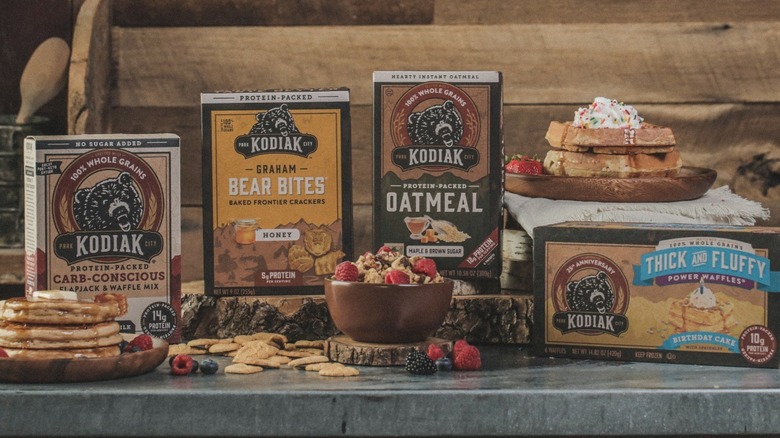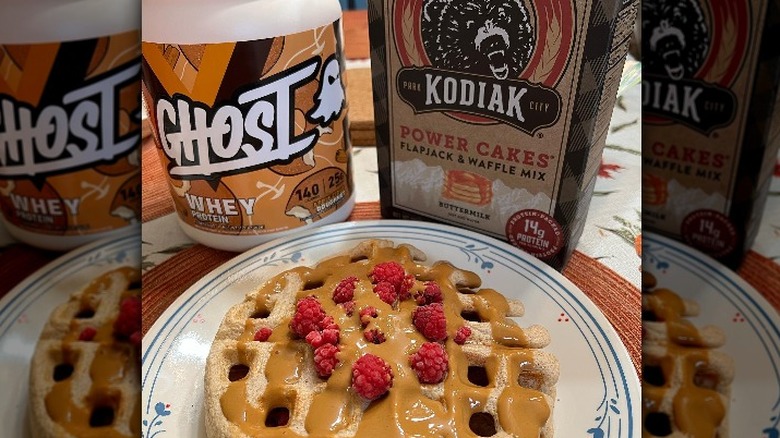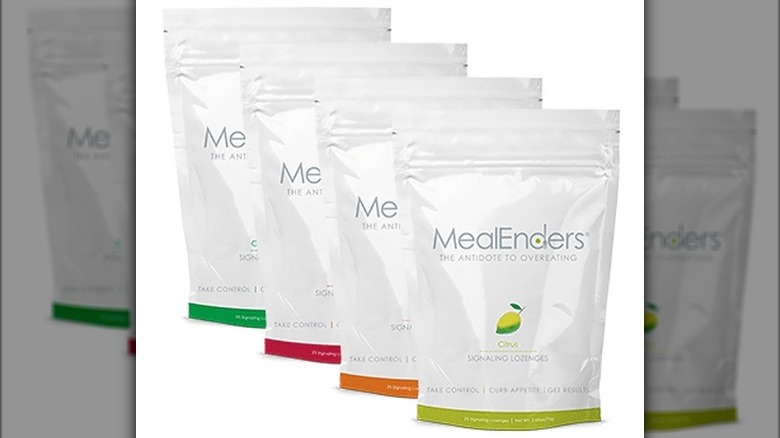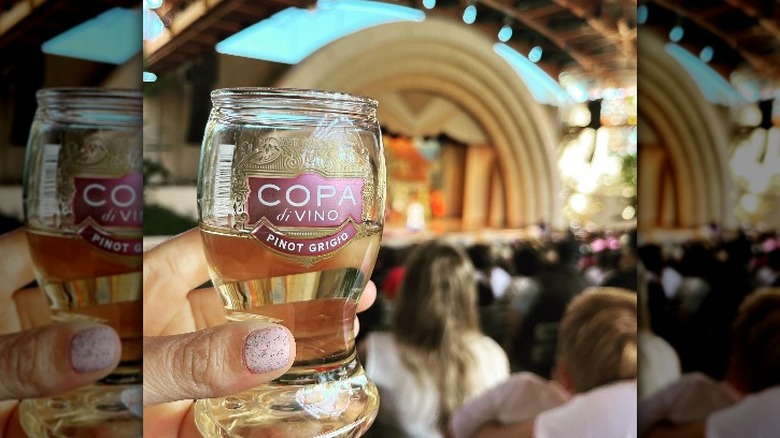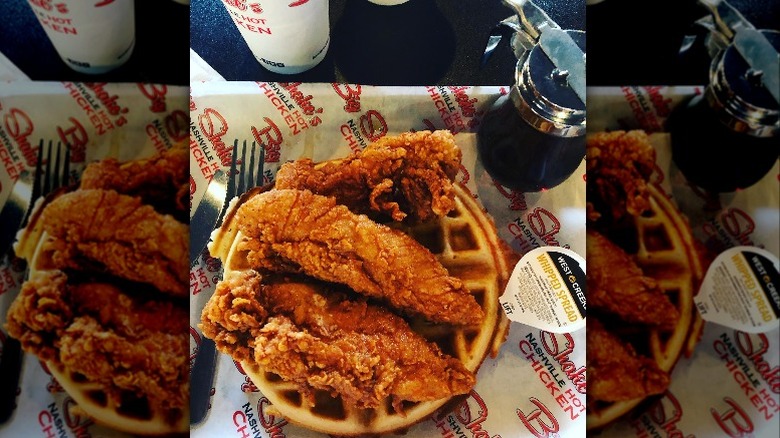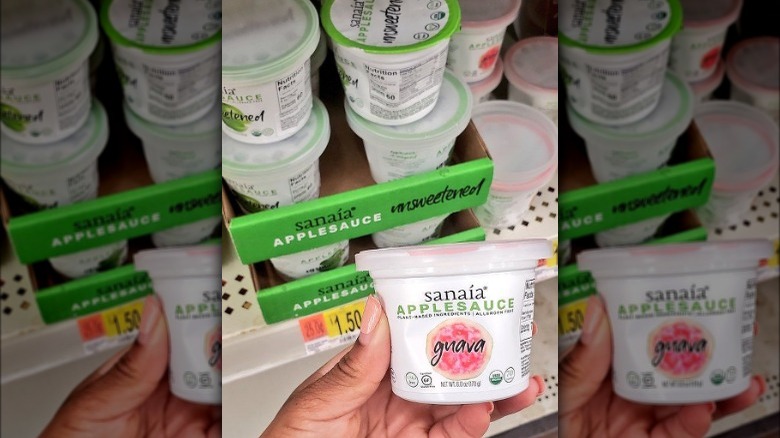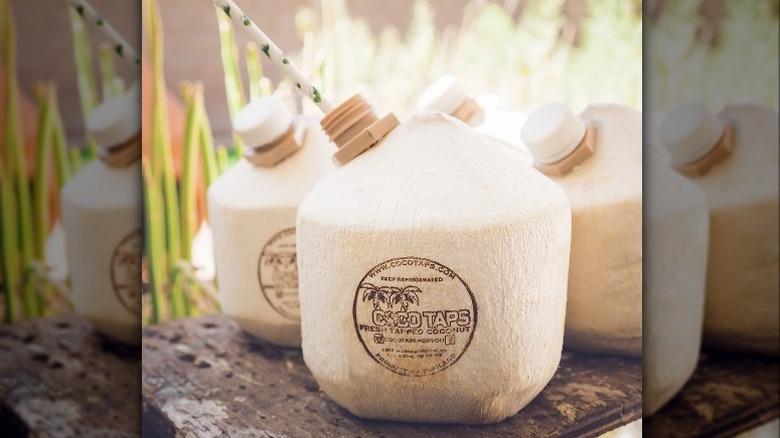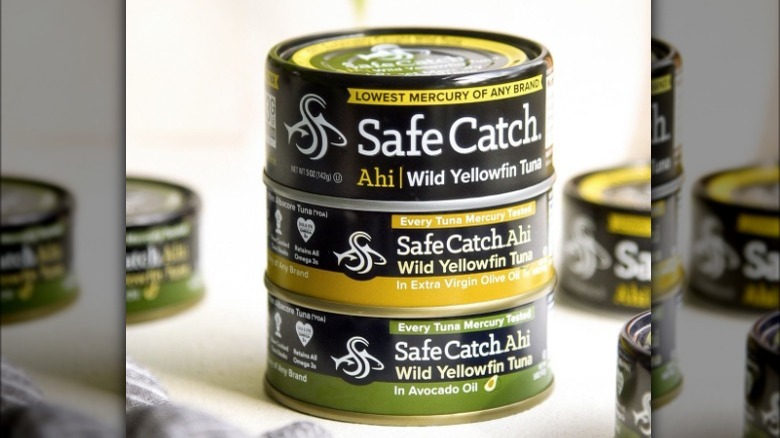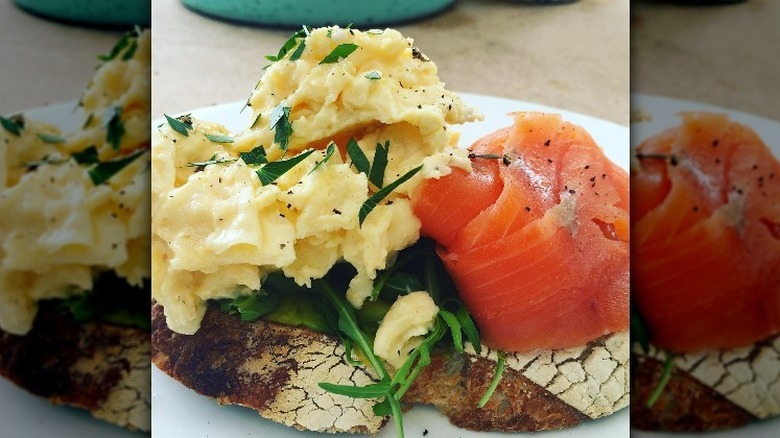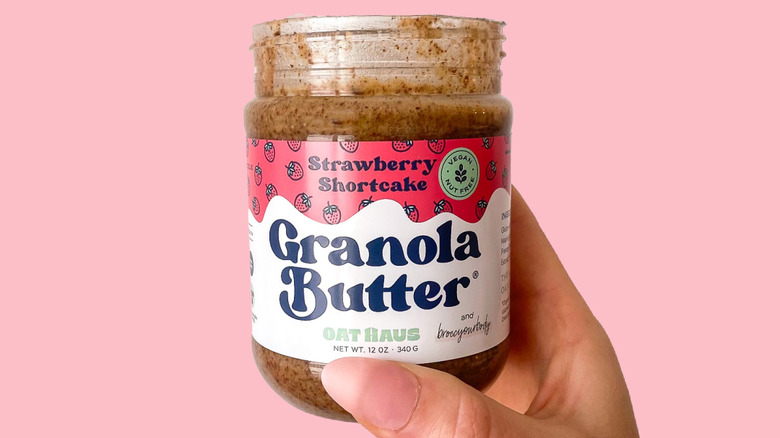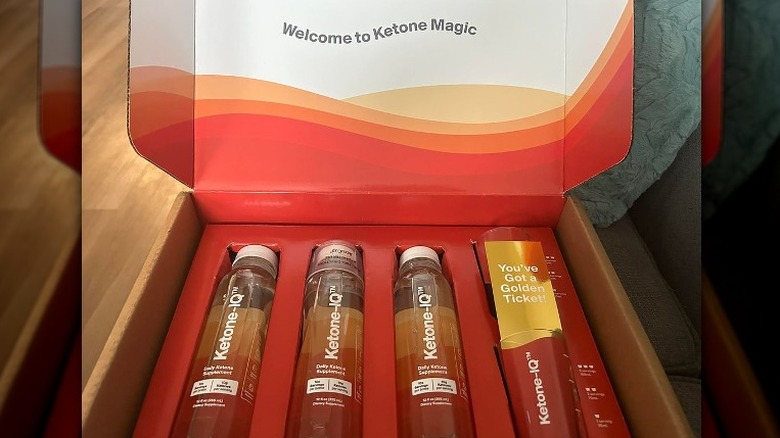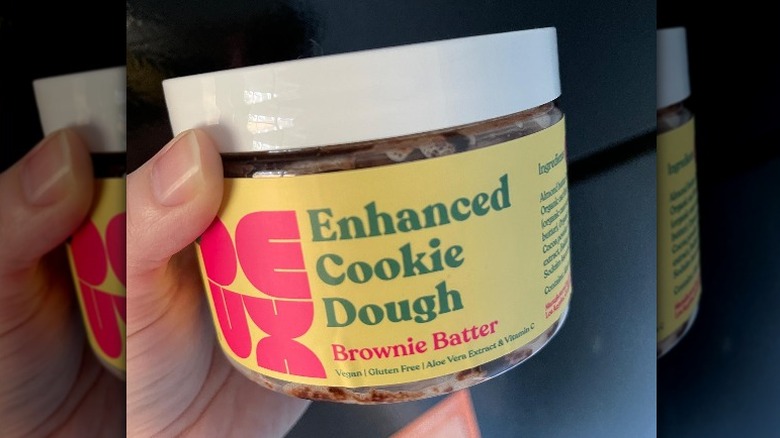11 Shark Tank Food Inventions The Sharks Shouldn't Have Passed On
The U.S. tends to have a thriving entrepreneurial spirit, and it's a great place to transform a pipe dream into a thriving business. "Shark Tank" is the ultimate modern-day destination for up-and-coming entrepreneurs. "Shark Tank" is a television show on which people with a business idea can seek the money and assistance they need to help make their ventures blossom.
The sharks are always being presented with novel ideas, from pitches involving new technologies to unique recipes. However, they aren't exempt from failing to make the best choice and unknowingly overlooking some food inventions that later went on to become quite successful.
While the sharks are now well-versed in business and have a good eye for the needs of the consumer, they likely regret not investing in businesses that are now booming.
Many business ventures that they've invested in over the years have failed, and a number of ideas they rejected went on to thrive. However, there are some "Shark Tank" food inventions that the sharks really shouldn't have passed on.
1. Kodiak Cakes
Kodiak Cakes is a breakfast classic that's enjoyed for its flavor and nutritional benefits. The brand's tasty whole-grain mixes can be found on store shelves around the country and are known for their high protein and nutrient content. This popular brand was started back in 1982 when a woman named Penny Clark had the idea of selling her father's whole wheat pancake mix with baking instructions, using her son as the adorable salesman. As an adult, her son Joel Clark turned his childhood task into a booming business, creating an entire brand around his grandpa's flapjack mix.
Although the product is currently thriving, when Clark and his partner Cameron Smith went on "Shark Tank," the product didn't have enough potential for the sharks to settle on a deal. None of the sharks felt confident enough to agree to the business owners' request of $500,000 for 10 percent, offering smaller amounts of money and higher profit percentages instead. Clark and Smith left the show empty-handed, feeling that none of the offers reflected the value of their brand. Looking back, it's easy to see that the sharks messed up with this one. Kodiak Cakes now makes almost $500 million a year, and it is continuing to thrive.
2. MealEnders Lozenges
The Sharks definitely shouldn't have passed on MealEnders, a candy lozenge designed to control overeating habits. People often overeat because the signal that their stomach is full comes too late, once they've already eaten more than their fill. MealEnders Lozenges are appetite suppressants that fix this problem, preventing the need to keep eating. They also have a sweet outer layer that provides the sweetness factor people often want after a savory meal, satisfying any dessert desires.
The creator, Mark Bernstein, made these lozenges after being told to lose some weight by a doctor. He'd had struggles with weight in the past because of a tendency to overeat at meals. This experience prompted him to start researching why people overeat, which led him to create his legendary lozenges. The entrepreneur went on the show hoping to receive $350,000 from the sharks in exchange for 8 percent profit. The sharks didn't make the deal for a number of reasons. Some didn't enjoy the taste of the lozenges, while others weren't a fan of the supplement business as a whole.
However, Bernstein was not to be discouraged. Even though none of the sharks invested in his product, his lozenges made an impression on the many viewers who struggle with overeating. Bernstein reportedly sold $400,000 worth of lozenges in the three days after being on "Shark Tank." A year later, the product had made $5 million, which the sharks can no longer cash in on.
3. Copa di Vino
The sharks sure misjudged Copa di Vino, a single-serve wine product sold in plastic containers. Creator James Martin created the idea while traveling through the vineyards of France. When he came home, he immediately began working to make it a reality. He created Copa di Vino with the goal of allowing wine lovers to enjoy high-quality wine without having to scramble for glasses and a corkscrew.
According to Oregon Wine Press, Martin first went on "Shark Tank" asking for $600,000 in exchange for 20 percent equity in his company. Despite his pitch and his neatly packaged product, the sharks were unimpressed with Martin's idea, and he left, exclaiming they had lost an opportunity. Forgiving this show of arrogance, the sharks let him back on the show the following season, making him the first business owner to appear on the show twice.
This time, he was seeking $300,000 for 5 percent of his business. Even though Martin made it on the show twice, he never settled on a deal. One shark was more enthralled with the wine's container than the drink itself, and others felt that Martin had the wrong attitude to be on the show. Although no deal was struck, Copa di Vino has since become a raging success, making 6 million dollars yearly. The brand is the most popular creator of single-serve wine in the world, and it seems to be doing just fine without the sharks.
4. Big Shake's Hot Chicken and Fish
Shawn Davis, also known as Chef Big Shake, went on "Shark Tank" in 2011, only to be rejected. At the time, he was promoting a burger patty made of shrimp, which came in teriyaki, Cajun, jalapeño, and original flavors. The chef created these patties after his daughter came home from school one day and announced that she was becoming a pescatarian. Rather than trying to convince her out of it, Davis hopped on board and decided to make a seafood version of a classic beef burger to ensure that she'd still consume enough protein. When he discovered his kids and neighbors loved his patties, Davis and his wife decided to turn them into a business: CBS Foods Incorporated.
Davis went on "Shark Tank" requesting $200,000 for 25 percent, but none of the sharks went for it. Although they were a fan of his burgers, they didn't feel the brand was worth the investment. However, viewers felt differently, and the invention became popular across the country after being on the show. Soon after the entrepreneur's appearance on "Shark Tank," the patties were being sold in over 800 grocery stores nationwide and went on to bring in over $5 million in yearly sales. Shark Mark Cuban has openly admitted his regrets about Big Shake's shrimp burgers, and you can't blame him. Chef Big Shake eventually shifted his business goals and opened a number of thriving fast-casual restaurants called Big Shake's Hot Chicken and Fish.
5. Sanaia Applesauce
Keisha Jeremy created Sanaia Applesauce thanks to her lifelong appreciation for fresh fruit and flavorful applesauce. She first started making homemade applesauce as a kid, and then in college, she continued the hobby when missing home. Her idea for the brand was born after she took a vacation to her birthplace in the Bahamas and brought back tamarind sauce which she added to her homemade applesauce. The combination got her thinking, and she decided to create a brand of applesauce for adults, adding in sophisticated flavors like lavender.
Jeremy brought her business idea to "Shark Tank" with the hopes of procuring $150,000 in exchange for 15 percent of her company. Mark Cuban tweaked the percentage up to 25 percent, which the entrepreneur accepted. However, for one reason or another, the deal never went through. The business continued on without the sharks' help, and Jeremy managed to get her product on shelves in Aldi, Walmart, and a number of other grocery stores.
Unfortunately, Sanaia Applesauce was forced to stop production during the pandemic, though it bounced back in the spring of 2022. Jeremy is back to selling gourmet applesauce to adults. It's available in a variety of flavors like elderflower, hibiscus, and lychee. We're happy to see Jeremy bring her business back, and we can't wait to see what the brand does next.
6. Coco Taps
Entrepreneur Coco Vinny Zaldivar went on "Shark Tank" with the hopes of receiving an investment for his coconut tapping product. Coco Taps drills a hole into coconuts and then reseals it so the user can finish the contents at any time. Zaldivar created it after being disappointed with the packaged coconut water on the market. He previously tried to drink it right from the coconut but soon discovered the difficulties surrounding tapping coconuts: He actually broke the knife at one point during the process.
However, Zaldivar wasn't discouraged, and he took matters into his own hands and created Coco Taps. The product not only allows consumers to drink fresh coconut water straight from the coconut, but it's also sustainable, using the coconut as a container. The entrepreneur went on "Shark Tank" requesting $150,000 for 10 percent of his business. He set the stage by playing the ukulele and bringing a hula girl to his pitch.
Despite Valdivar's attention-grabbing pitch, the sharks weren't on board with the product and commented that his ideas needed more focus. The invention has since proven them wrong by continuing to succeed. In the years following its rejection, Coco Taps made $234,000 and $300,000 in sales. The business took a hit during the Covid-19 pandemic but bounced back, and it is now introducing a new product, Coco Love Water.
7. Safe Catch
Sean Wittenberg and Bryan Boches went on "Shark Tank" to pitch their sustainable canned tuna business. As they explained to the sharks, the entrepreneurs' mission is to provide healthy and environmentally-friendly seafood to families. The company only uses tuna from sustainable fisheries, and it tests all the fish for mercury. This process is much more extensive than the one followed by the average seafood brand. Additionally, Safe Catch uses no preservatives in its fish.
Not only is this sustainable seafood healthier than average, but it's also tastier. Unlike other canned seafood brands, Safe Catch packages the uncooked fish and then cooks it after canning. This results in a superior flavor and a healthier product. Boches and Wittenberg came to the sharks looking to receive $600,000 for 3 percent of the business. Despite the entrepreneurs' noble intentions and solid business plan, the sharks weren't sold on the idea and quickly dropped out, citing the cost of production as the reason.
However, it looks like the sharks missed out on a great business opportunity with this food invention, as Safe Catch is currently sold at over 12,000 stores around the world and is growing at a quicker rate than any of its competition. The brand's yearly sales are topping $5 million and only going up, and the sharks aren't getting any part of its success.
8. Uprising Bread
William and Kristen Schumacher appeared on "Shark Tank" to promote their low-carb gluten-free bread, Uprising. The couple started their company with the dream of making healthy and delicious bread that could be enjoyed regardless of dietary restrictions. This keto-friendly, gluten-friendly, dairy-free bread has no preservatives and is as healthy and natural as it gets. The couple paired up with the creators of Blue Oven Bakery to bring their dreams to reality.
The bread-loving business owners came to the sharks seeking $500,000 for 3 percent of their business. To aid their pitch, they provided the sharks with pieces of bread, along with samples of bread-based recipes like grilled cheese and French toast. Although the sharks loved the taste of the bread, they weren't willing to invest in it for reasons that varied from its price to its appearance. The sharks dropped out one by one, and Uprising Bread left "Shark Tank" with nothing to show for it.
However, Uprising has done well without the support of the sharks. After appearing on the show, the business received a flood of support from viewers, proving that consumers resonated with their product. The business went on to bring in $5 million in revenue the following year, and it's clear that it didn't need the sharks' investment to succeed. Although Uprising is now closing for unknown reasons, it has had a good run of success.
9. Oat Haus Granola Butter
Ali Bonar, Eric Katz, and Ari Schraer created Oat Haus Granola Butter as an alternative to nut butter. Bonar came up with the idea after struggling with food intolerances for many years. She paired up with her boyfriend, Katz, and his chef friend, Schraer, to turn her idea into a reality. The business was originally named Kween but was eventually rebranded to become Oat Haus.
The three appeared on "Shark Tank" asking for $375,000 for 5 percent of the company. They shared the product's story and explained the perks of the nut-free, soy-free, dairy-free butter. The entrepreneurs provided the sharks with original, vanilla, chocolate, and blueberry-flavored granola butter and received mainly positive feedback.
Although the sharks generally enjoyed the product and Bonar's story, none of them decided to invest in the unique oat-based butter. However, the sharks messed up by passing up this offer, as Oat Haus granola butter is now sold in many stores and has only continued to grow. After being rejected on "Shark Tank," the product's sales increased by 300 percent. The company made around $2.5 million in sales in 2021 and was projected to make $3 million the following year.
10. NootroBox
Michael Brandt and Geoffrey Woo brought NootroBox to "Shark Tank" in 2016 with the hopes of receiving a $2 million investment in exchange for 5 percent equity. Their creation, NootroBox, are nootropic supplements meant to improve brain function and maximize capabilities like creativity and concentration. The entrepreneurs struggled to sell their product effectively and failed to convince the sharks their product was worth an investment. The sharks dropped out one by one, saying that the business owners weren't marketing their products well.
Despite the on-air rejection, a fair deal of criticism, and a few setbacks, Brandt and Woo's supplement brand is currently succeeding. NootroBox now goes by the name HVMN, which stands for Health Via Modern Nutrition. Along with the rebranding, the business has expanded its products and sells supplements in powder and liquid form, as well as the option for customers to create bundles and kits with their favorite items. HVMN has a revenue of $12 million, and we can only guess what the business will do next.
11. Deux Cookie Dough
Sabeena Ladha went on "Shark Tank" seeking investment for her plant-based, nutrient-rich cookie dough. In the past few years, supplements became a key component of Ladha's routine, which got her thinking about opportunities surrounding the immunity sector. She and a friend decided to create a special cookie dough packed with supplements. They paired up with a naturopathic doctor to create the dough and began selling it through Instagram. Ladha wasn't expecting such an influx of sales when she put her product on the market, but sales took off immediately, and she met her goal for the year in the first week. Jumping on the success of her invention, she left her job and began to devote all of her energy to the brand.
Although Ladha's business was already taking off, she was hoping for a little help from the sharks when she went on "Shark Tank." She asked for $300,000 in investment for 10 percent of her company, but none of the sharks went for it. Although she received amazingly positive feedback from them, none of them resonated enough with the product to make an investment. Even though she didn't land a deal, Deux Cookie Dough took off and was expected to make $5 million in sales in 2022. The brand was featured in Forbes and can be found in a number of grocery stores, where it provides consumers with a healthy alternative to regular cookie dough.
